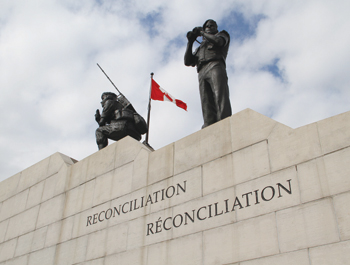Library of Parliament Research Publications
Occasional and Commissioned Papers
Selected Key Themes Addressed in IPU Assemblies
Peace and Security
Since its inception, the Inter-Parliamentary Union has studied all questions to which the solution may help maintain peace among nations. It will continue to bring together all peace-loving parliamentarians, and to cooperate in shaping a society in which the “final argument” of nations will be solely that of justice. — Senator Raoul Dandurand, 1927
Known in its early days as the “Inter-Parliamentary Conference for Peace and Arbitration,” the IPU has traditionally focused not only on broad questions of peace and security, but also on specific conflicts and threats. This is perhaps why Canadian parliamentarians have always seen the Union as a key forum for international political dialogue and cooperation. Their long-standing involvement in IPU debates and studies on these topics has consistently reflected a deep commitment to the human rights and democratic values so central to the Canadian society they represent.
Peacekeeping
In light of Canada’s important role in the establishment of the first United Nations (UN) peacekeeping force in 1956 and in many later operations, it is not surprising that Canadian IPU delegates have often taken a stand on peacekeeping and peace-building initiatives and related issues. As Beryl Gaffney, MP, said in 1997 (Seoul): “Successive Canadian governments have consistently regarded peacekeeping as one of the most important mechanisms for dealing with world crises.” In 1998 (Windhoek), Marlene Catterall, MP, explained that, over time, Canadian interventions and contributions reflected the changing international security environment, which was characterized by a decline in the number of wars between states and an increase in intra-state conflicts, often with significant civilian casualties. She noted that, since the 1990s, this had led to a growing focus on what came to be known as human security as opposed to national security. Correspondingly, the focus of IPU discussions had shifted from peacekeeping, as a means of separating warring armies, to peace-building which had to put in place the minimum conditions under which a country could be governed peacefully and ensure the security of its citizens.

Peacekeeping Monument (Ottawa) Photographer: Ken Banks
The Inter-Parliamentary Union has recognized the necessity of stimulating debate on international peace and cooperation in parliaments and beyond them in wide public circles before governments reach their decisions. The drive to achieve collective security through permanent international institutions, which has characterized the best in political thought in this century, has been closely linked to the desire to widen the basis of public interest in public policy. — Paul Martin Sr., Secretary of State for External Affairs, 1965
Canada has a very small population and we have attempted to exercise our limited influence in the world as peacemakers, peacekeepers and peace brokers. We use our democratic institutions and our Charter of Rights and Freedoms to demonstrate to the world our view that, for instance, respect of human rights is a prerequisite for peace within individual states and even more importantly that a parliament consisting of representatives freely and fairly elected is the best guarantee of human dignity and the prosperity of citizens. — Senator Donald H. Oliver, 2000
Terrorism
International terrorism has been another major topic of debate at the IPU, and one that Canadian delegates have often addressed. For example, in 1978 (Lisbon), Senator Joan Neiman asked fellow delegates to urge their parliaments and governments to accede to and ratify all existing conventions and agreements dealing with international terrorism; and she called on the IPU to develop definitions and formulate agreements that could serve as models for governments preparing legislation in this area. On behalf of the Canadian delegation, she submitted a draft resolution establishing basic criteria for the definition of international terrorism.
Over the years, Canadian IPU delegates have supported several resolutions condemning international terrorism and calling upon all states to adopt appropriate measures to tackle this problem and its social, political and economic causes, while respecting human rights and the rule of law. The September 2001 attacks on the United States brought renewed urgency to efforts to address the threat of international terrorism. As Paddy Torsney, MP, told the assembly in 2003 (Chile), “On 9-11 as the IPU was meeting in Ouagadougou, cold-blooded killers struck a blow at the values and beliefs of free and civilized people everywhere. The event occurred in New York and Washington, but it is clear – the world was attacked. Terrorism is a global threat.”
Similarly, Larry Miller, MP, argued in 2008 (Cape Town) that terrorism erodes democracy and human rights and that all countries must do their part to fight it.
If we are to make and keep peace in countries that are victims of conflicts, not only military security but also human security must be guaranteed. That is where peace-building comes in: a series of measures to strengthen and solidify peace by building a sustainable infrastructure for human security. The purpose of peace-building is to create the basic conditions in which a country can take charge of its future, and in which social, political and economic development becomes possible. — Raymonde Folco, MP, 1998
Conference on European Cooperation and Security (CECS)
Between 1973 and 1991, the IPU held seven CECSs outside of its statutory assemblies. During the Cold War, the CECS was the sole parliamentary forum for legislators of Eastern and Western Europe to discuss cooperation and security matters. At times when government-to-government negotiations had stalled, the CECS had a vital role in improving the climate for further talks. Canadian delegates participated actively during all these special meetings, both in the formal sessions and also in informal discussions and contacts. They submitted memoranda and draft resolutions and worked on study committees and drafting groups. Through the years, they maintained a firm position on such issues as security, human rights, economic cooperation and family reunification. The resolutions adopted by these conferences included key elements of the Canadian Group’s contributions, thus confirming Canada’s status as a valued participant.
© Library of Parliament 2012

